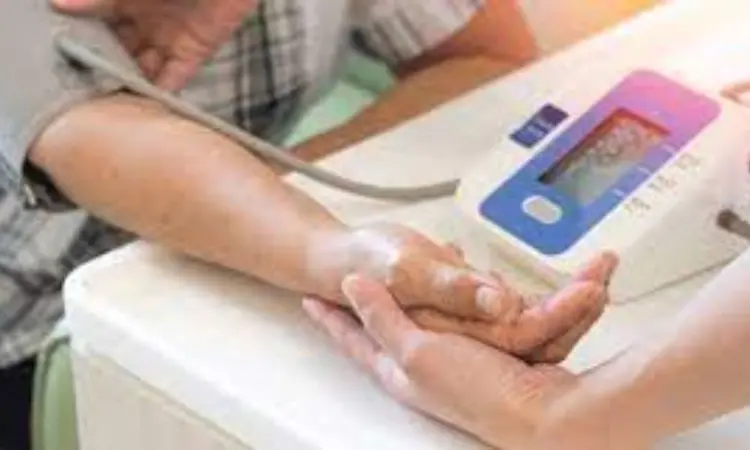- Home
- Medical news & Guidelines
- Anesthesiology
- Cardiology and CTVS
- Critical Care
- Dentistry
- Dermatology
- Diabetes and Endocrinology
- ENT
- Gastroenterology
- Medicine
- Nephrology
- Neurology
- Obstretics-Gynaecology
- Oncology
- Ophthalmology
- Orthopaedics
- Pediatrics-Neonatology
- Psychiatry
- Pulmonology
- Radiology
- Surgery
- Urology
- Laboratory Medicine
- Diet
- Nursing
- Paramedical
- Physiotherapy
- Health news
- Fact Check
- Bone Health Fact Check
- Brain Health Fact Check
- Cancer Related Fact Check
- Child Care Fact Check
- Dental and oral health fact check
- Diabetes and metabolic health fact check
- Diet and Nutrition Fact Check
- Eye and ENT Care Fact Check
- Fitness fact check
- Gut health fact check
- Heart health fact check
- Kidney health fact check
- Medical education fact check
- Men's health fact check
- Respiratory fact check
- Skin and hair care fact check
- Vaccine and Immunization fact check
- Women's health fact check
- AYUSH
- State News
- Andaman and Nicobar Islands
- Andhra Pradesh
- Arunachal Pradesh
- Assam
- Bihar
- Chandigarh
- Chattisgarh
- Dadra and Nagar Haveli
- Daman and Diu
- Delhi
- Goa
- Gujarat
- Haryana
- Himachal Pradesh
- Jammu & Kashmir
- Jharkhand
- Karnataka
- Kerala
- Ladakh
- Lakshadweep
- Madhya Pradesh
- Maharashtra
- Manipur
- Meghalaya
- Mizoram
- Nagaland
- Odisha
- Puducherry
- Punjab
- Rajasthan
- Sikkim
- Tamil Nadu
- Telangana
- Tripura
- Uttar Pradesh
- Uttrakhand
- West Bengal
- Medical Education
- Industry
Hypertension: KARDIA-1 trial suggests zilebesiran potentially effective antihypertensive with quarterly or biannual dosing

USA: RNA interference with zilebesiran can significantly lower blood pressure for up to 6 months, indicating potential for use as an effective antihypertensive with quarterly or biannual dosing, as shown by the KARDIA-1 Randomized Clinical Trial.
The findings were published online in the Journal of the American Medical Association (JAMA) on February 16, 2024.
"Our phase 2 trial revealed that subcutaneous zilebesiran doses of 150, 300, or 600 mg every 6 months or 300 mg every 3 months significantly reduced 24-hour mean systolic blood pressure (BP) at 3 and 6 months versus placebo," the researchers reported.
"Non-serious drug-related adverse events occurred in 16.9% of zilebesiran-treated patients, principally mild hyperkalemia and injection site reactions."
Angiotensinogen is the most upstream precursor of the renin–angiotensin–aldosterone system, a critical pathway in BP regulation. Zilebesiran is an investigational RNA interference therapeutic that targets hepatic angiotensinogen synthesis. George L. Bakris, University of Chicago Medicine, Chicago, Illinois, and colleagues aimed to evaluate the antihypertensive safety and efficacy of different zilebesiran dosing regimens.
For this purpose, the research team performed a phase 2, randomized, double-blind, dose-ranging study of zilebesiran vs placebo at 78 sites across 4 countries. Screening initiation occurred in July 2021 and the last patient visit of the 6-month study occurred in June 2023.
Adults with mild to moderate hypertension, defined as daytime mean ambulatory SBP of 135 to 160 mm Hg following antihypertensive washout, were randomized. Of 394 randomized patients, 377 (302 receiving zilebesiran and 75 receiving placebo) comprised the full analysis set, 44.3% women; mean age, 57 years).
Patients were randomized to 1 of 4 subcutaneous zilebesiran regimens (150, 300, or 600 mg once every 6 months or 300 mg once every 3 months) or placebo (once every 3 months) for six months.
The study's primary endpoint was the change in the between-group difference in least-squares mean (LSM) from baseline to month 3 in 24-hour mean ambulatory SBP.
The study led to the following findings:
- At 3 months, 24-hour mean ambulatory SBP changes from baseline were −7.3 mm Hg with zilebesiran, 150 mg, once every 6 months; −10.0 mm Hg with zilebesiran, 300 mg, once every 3 months or every 6 months; −8.9 mm Hg with zilebesiran, 600 mg, once every 6 months; and 6.8 mm Hg with placebo.
- LSM differences vs placebo in change from baseline to month 3 were −14.1 mm Hg with zilebesiran, 150 mg, once every 6 months; −16.7 mm Hg with zilebesiran, 300 mg, once every 3 months or every 6 months; and −15.7 mm Hg with zilebesiran, 600 mg, once every 6 months.
- Over 6 months, 60.9% of patients receiving zilebesiran had adverse events vs 50.7% of patients receiving a placebo and 3.6% had serious adverse events vs 6.7% receiving a placebo.
- Nonserious drug-related adverse events occurred in 16.9% of zilebesiran-treated patients (principally injection site reactions and mild hyperkalemia) and 8.0% of placebo-treated patients.
In his study of patients with mild to moderate hypertension, treatment with zilebesiran across a range of doses at 3-month or 6-month intervals significantly lowered 24-hour mean ambulatory systolic blood at month 3.
"These data support further investigation of zilebesiran as a therapeutic strategy for hypertension patients," the research team concluded.
Reference:
Bakris GL, Saxena M, Gupta A, et al. RNA Interference With Zilebesiran for Mild to Moderate Hypertension: The KARDIA-1 Randomized Clinical Trial. JAMA. Published online February 16, 2024. doi:10.1001/jama.2024.0728
Dr Kamal Kant Kohli-MBBS, DTCD- a chest specialist with more than 30 years of practice and a flair for writing clinical articles, Dr Kamal Kant Kohli joined Medical Dialogues as a Chief Editor of Medical News. Besides writing articles, as an editor, he proofreads and verifies all the medical content published on Medical Dialogues including those coming from journals, studies,medical conferences,guidelines etc. Email: drkohli@medicaldialogues.in. Contact no. 011-43720751


